翻译加造句
造句翻译练习
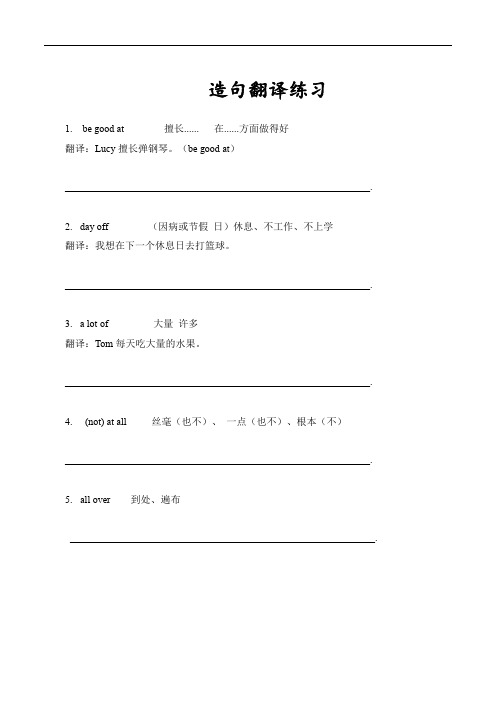
造句翻译练习1. be good at 擅长...... 在......方面做得好翻译:Lucy擅长弹钢琴。
(be good at)_____________________________________________________________.2.day off (因病或节假日)休息、不工作、不上学翻译:我想在下一个休息日去打篮球。
_____________________________________________________________.3. a lot of 大量许多翻译:Tom每天吃大量的水果。
_____________________________________________________________.4.(not) at all 丝毫(也不)、一点(也不)、根本(不)_____________________________________________________________.5.all over 到处、遍布_____________________________________________________________.阅读理解Passage 7It was a pretty street with many nice houses. At the comer, there was no house, just land. Mr. March bought the land . On it he put a building with two stores.The people on that street did not like the stores. The stores made their street ugly. But there was no law to stop Mr. March.A man across the street sold his house. The people who bought it did not live there. They used it to make things to sell.Before long, other houses were sold. These houses were used as stores, too. Once these houses had cost a lot of money. Now they were not worth as much money. And the pretty street was not pretty any more.Today, we have a law to keep this from happening. This law is called “Zoning(美国的区域法). ” The zoning law tells people where they can build stores and where they can build houses.1.At the comer of the pretty street was ______.A.a house B.just land C.one store D.a barn 2.Which of the following does this story lead you to believe?A.Stores make good houses for people to live in. B.All buildings have at least two stores in them. C.The people who built our cities did not plan ahead.3.What did the stores do to the street? (Which sentence is exactly like the one in your book?) [ ]A.The stores made their street rich. B.The stores made their street pretty. C.The stores made their street ugly.4.The main idea of the whole story is that ______.A.the people were ugly B.stores make streets beautiful C.zoning in a city is importantPassage8One morning in London. The weather was very cold, and many people caught a cold. They had to see a doctor, so there were many people in the doctor's waiting-room. At the head of the line was an old woman. The woman did not live in London. She lived in Scotland (苏格兰). She came here to visit her daughter. She wanted to see the doctor because she got a bad cold and coughed day and night.“If I get there early, I can see the doctor quickly, ” she thought. So s he was the first in the line. She sat nearest to the doctor's door. An American came into the waiting-room, and walked quickly to the doctor's door. The old woman thought he was a queue jumper. She stood up and took his arm slowly, she said, “We were all h ere beforeyou. You must wait for your turn. Do you understand?” The American answered, “No, madam. You don't understand! You are all after me! I'm the doctor! ”1.How many people were there in the doctor's waiting-room ?A.A few people. B.A lot of people. C.Few people. D.Nobody. 2.The woman came ______. [ ]A.from the country B.from a town C.from a factory D.from a farm 3.The old woman was the first in the line so that she could ______.A.spend less time B.spend less moneyC.see the doctor quickly D.have a talk with the doctor 4.Where did the doctor come from?A.England. B.Scotland C.America. D.London.。
翻译造句大全简单
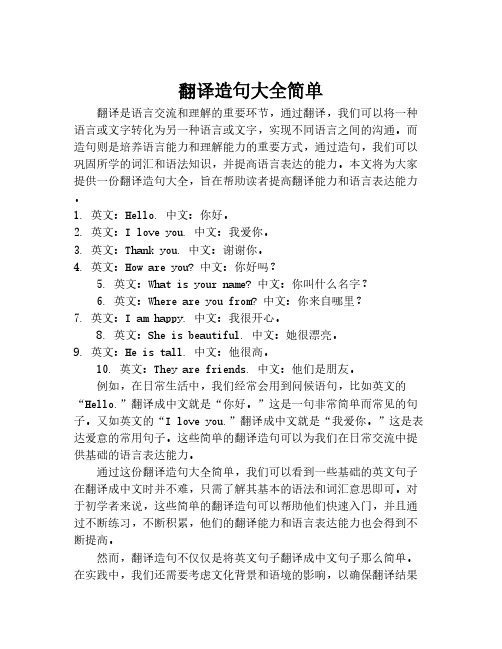
翻译造句大全简单 翻译是语言交流和理解的重要环节,通过翻译,我们可以将一种语言或文字转化为另一种语言或文字,实现不同语言之间的沟通。
而造句则是培养语言能力和理解能力的重要方式,通过造句,我们可以巩固所学的词汇和语法知识,并提高语言表达的能力。
本文将为大家提供一份翻译造句大全,旨在帮助读者提高翻译能力和语言表达能力。
1. 英文:Hello. 中文:你好。
2. 英文:I love you. 中文:我爱你。
3. 英文:Thank you. 中文:谢谢你。
4. 英文:How are you? 中文:你好吗? 5. 英文:What is your name? 中文:你叫什么名字? 6. 英文:Where are you from? 中文:你来自哪里?7. 英文:I am happy. 中文:我很开心。
8. 英文:She is beautiful. 中文:她很漂亮。
9. 英文:He is tall. 中文:他很高。
10. 英文:They are friends. 中文:他们是朋友。
例如,在日常生活中,我们经常会用到问候语句,比如英文的“Hello.”翻译成中文就是“你好。
”这是一句非常简单而常见的句子。
又如英文的“I love you.”翻译成中文就是“我爱你。
”这是表达爱意的常用句子。
这些简单的翻译造句可以为我们在日常交流中提供基础的语言表达能力。
通过这份翻译造句大全简单,我们可以看到一些基础的英文句子在翻译成中文时并不难,只需了解其基本的语法和词汇意思即可。
对于初学者来说,这些简单的翻译造句可以帮助他们快速入门,并且通过不断练习,不断积累,他们的翻译能力和语言表达能力也会得到不断提高。
然而,翻译造句不仅仅是将英文句子翻译成中文句子那么简单。
在实践中,我们还需要考虑文化背景和语境的影响,以确保翻译结果准确传达源语言的意思。
因此,为了提高自己的翻译能力,我们还需要不断学习和积累相关的知识,例如阅读更多的英文资料和文章,扩大自己的词汇量和语言理解能力。
interesting造句简单带翻译
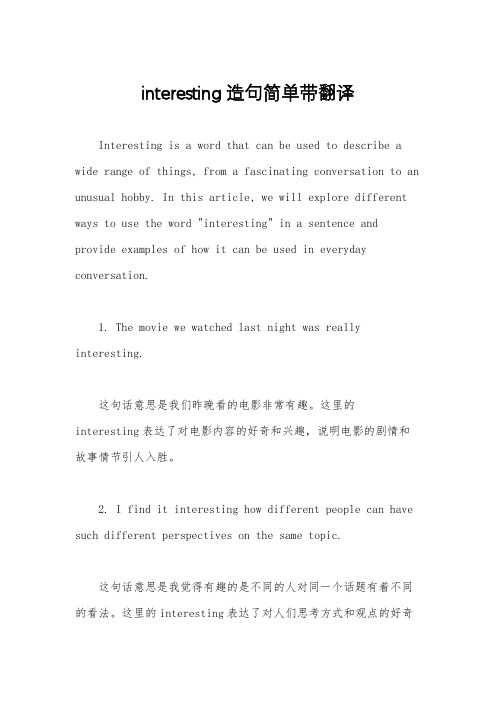
interesting造句简单带翻译Interesting is a word that can be used to describe a wide range of things, from a fascinating conversation to an unusual hobby. In this article, we will explore different ways to use the word "interesting" in a sentence and provide examples of how it can be used in everyday conversation.1. The movie we watched last night was really interesting.这句话意思是我们昨晚看的电影非常有趣。
这里的interesting表达了对电影内容的好奇和兴趣,说明电影的剧情和故事情节引人入胜。
2. I find it interesting how different people can have such different perspectives on the same topic.这句话意思是我觉得有趣的是不同的人对同一个话题有着不同的看法。
这里的interesting表达了对人们思考方式和观点的好奇和探究。
3. The history of ancient civilizations is incredibly interesting to me.这句话意思是我对古代文明的历史非常感兴趣。
这里的interesting表达了对历史和文化的好奇和热爱。
4. Learning a new language is both challenging and interesting.这句话意思是学习一门新语言既具有挑战性又有趣。
英语短语造句加翻译

英语短语造句加翻译1. Break the ice. (打破沉默)。
I tried to break the ice with my new colleague by asking him about his hobbies.2. Cut corners. (杜撰,走捷径)。
If you cut corners while writing your thesis, the quality will suffer.3. Hit the books. (用功学习)。
I need to hit the books tonight and study for my exam tomorrow.4. Give it a shot. (尝试一下)。
I've never played tennis before, but I'm willing to give ita shot.5. Keep your chin up. (振作精神)。
Even though you failed the test, you need to keep your chin up and try again.6. Make ends meet. (维持生计)。
With a low-paying job, it's difficult to make ends meet.7. Pull someone's leg. (开玩笑)。
I was just pulling your leg when I told you there was a shark in the swimming pool.8. Take it easy. (放轻松)。
After a long day at work, I like to take it easy and watch some TV.9. Time flies. (光阴似箭)。
I at 造句带翻译
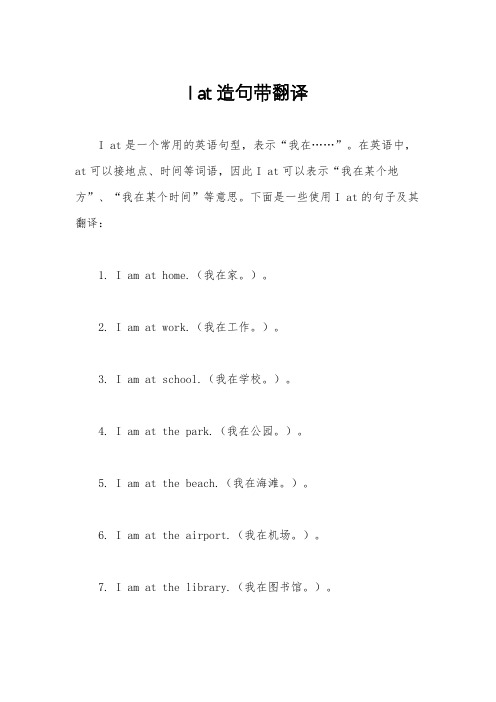
I at 造句带翻译I at是一个常用的英语句型,表示“我在……”。
在英语中,at可以接地点、时间等词语,因此I at可以表示“我在某个地方”、“我在某个时间”等意思。
下面是一些使用I at的句子及其翻译:1. I am at home.(我在家。
)。
2. I am at work.(我在工作。
)。
3. I am at school.(我在学校。
)。
4. I am at the park.(我在公园。
)。
5. I am at the beach.(我在海滩。
)。
6. I am at the airport.(我在机场。
)。
7. I am at the library.(我在图书馆。
)。
8. I am at the gym.(我在健身房。
)。
9. I am at the cinema.(我在电影院。
)。
10. I am at the restaurant.(我在餐厅。
)。
这些句子都是基于地点的,表示人物所在的位置。
除了地点,I at还可以表示时间,例如:1. I am at 9 o'clock.(我在九点。
)。
2. I am at noon.(我在中午。
)。
3. I am at night.(我在晚上。
)。
4. I am at the weekend.(我在周末。
)。
5. I am at Christmas.(我在圣诞节。
)。
这些句子都是基于时间的,表示人物所处的时间点或时间段。
除了地点和时间,I at还可以表示状态或行为,例如:1. I am at a loss.(我不知所措。
)。
2. I am at ease.(我很放松。
)。
3. I am at peace.(我很平静。
)。
4. I am at a disadvantage.(我处于不利地位。
)。
5. I am at a crossroads.(我处于十字路口。
)。
这些句子都是基于状态或行为的,表示人物的心理或行为状态。
总之,I at是一个非常常用的英语句型,可以表示人物所在的地点、时间、状态或行为等。
翻译与造句
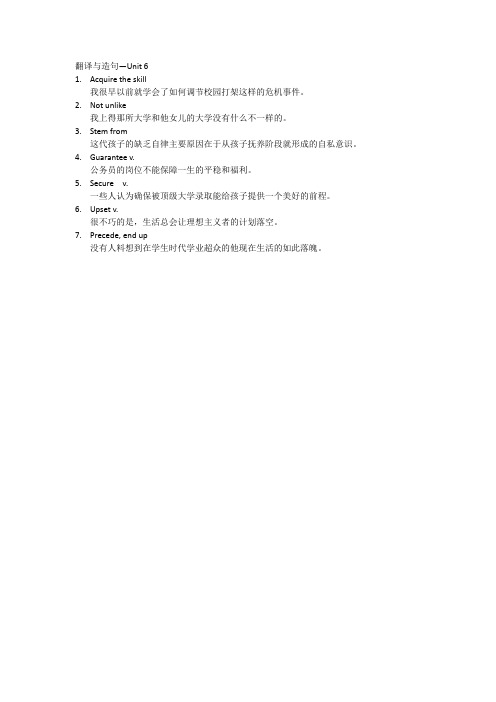
翻译与造句—Unit 6
1.Acquire the skill
我很早以前就学会了如何调节校园打架这样的危机事件。
2.Not unlike
我上得那所大学和他女儿的大学没有什么不一样的。
3.Stem from
这代孩子的缺乏自律主要原因在于从孩子抚养阶段就形成的自私意识。
4.Guarantee v.
公务员的岗位不能保障一生的平稳和福利。
5.Secure v.
一些人认为确保被顶级大学录取能给孩子提供一个美好的前程。
6.Upset v.
很不巧的是,生活总会让理想主义者的计划落空。
7.Precede, end up
没有人料想到在学生时代学业超众的他现在生活的如此落魄。
英语翻译+造句

英语翻译+造句翻译1.自从有了移动电话后,他再也没有给朋友写信了。
(no longer)He has no longer written to his friends ever since he got a mobile phone. 2.尽管很忙,他每天至少花两小时上网(surf the internet),了解这个领域的最新动态。
(even though)Even though he is very busy, he spends at least two hours every day surfing the Internet, aiming to know about the latest development in this area / field.3.李教授在毕业典礼上作了一个简短的讲话,他的话深深铭刻在我的记忆中。
(impress upon)Professor Li made a short speech at the commencement, his words of which were deeply impressed upon my memory.4.讲到期末考试,学生们一点儿都不紧张,他们满脸都是自信。
(confidence)Talking of the final exams the students were not nervous at all. On their faces was confidence.5.在30分钟内写出一篇约100个词的短文,对于他们班大多数学生来说不过是小菜一碟。
(snap)To write a short passage of about 100 words within 30 minutes would be a snap to most students in their class.6.我发觉自己对英语口语有着浓厚的兴趣。
(find…doing)I have found myself having great interest in spoken English.7.驱车行驶在高速公路上,我意识到近几年来,中国的公路系统发生了巨大的变化。
造句+翻译

not in the leastfind one’s wayon occasionthrow light onin due coursemake up forin retrospectc ome to sb’s rescuework onon one hand ...on the other hand lock upkeep track ofon demandf rom sb’s point of viewgo on vacationthink twicefall apartend up (doing sth)Unit 2be confronted withfill outfall intonothing more thanwear and tearwell- offout of placeshortly afterin contrast togo southgo throughget away withby all accountsblend int hrow one’s weight aroundhold tosteer clear ofon the runmake uplay downon boardcome into contact (with)in unisonhand downat any ratenarrow downcome overknow better thanover and overrely onapart fromrun errandstime zoneand the likek eep…in the darkk eep…at baybe up toUnit 4at timeson linetake inbut thenbe sucked in/intoin sightset apartbe hooked onon top ofon the wholet o one’s knowledge needless to saycall forthUnit 5coincide withon one/two/several occasion(s) be ashamed ofi n one’s mind’s eyein good healthin excellent healthin poor healthsuffer fromin spite ofto a degreehold on to翻译:1. 背离传统需要极大的勇气。
- 1、下载文档前请自行甄别文档内容的完整性,平台不提供额外的编辑、内容补充、找答案等附加服务。
- 2、"仅部分预览"的文档,不可在线预览部分如存在完整性等问题,可反馈申请退款(可完整预览的文档不适用该条件!)。
- 3、如文档侵犯您的权益,请联系客服反馈,我们会尽快为您处理(人工客服工作时间:9:00-18:30)。
一、翻译1. The idea of consciously seeking out a special title was new to me., but not without appeal.让我自己挑选自己最喜欢的书籍这个有意思的想法真的对我具有吸引力。
2.I was plunged into the aching tragedy of the Holocaust, the extraordinary clash of good, represented by the one decent man, and evil.我陷入到大屠杀悲剧的痛苦之中,一个体面的人所代表的善与恶的猛烈冲击之中。
3.I was astonished by the the great power a novel could contain. I lacked the vocabulary to translate my feelings into words.我被这部小说所包含的巨大能量感到震惊。
我无法用语言来表达我的感情(心情)。
4,make sth. long to short长话短说5.I learned that summer that reading was not the innocent(简单的) pastime(消遣) I have assumed it to be., not a breezy, instantly forgettable escape in the hammock(吊床),( though I’ ve enjoyed many of those too ). I discovered that a book, if it arrives at the right moment, in the proper season, will change the course of all that follows.那年夏天,我懂得了读书不是我认为的简单的娱乐消遣,也不只是躺在吊床上,一阵风吹过就忘记的消遣。
我发现如果在适宜的时间、合适的季节读一本书的话,他将能改变一个人以后的人生道路。
二、词组造句1. on purpose 特意,故意This is especially true here, and it was ~.(这一点在这里尤其准确,并且他是故意的)2.think up 虚构,编造,想出She has thought up a good idea. 她想出了一个好的主意。
His story was thought up. 他的故事是编出来的。
3. in the meantime 与此同时助记:in advance 事前in the meantime 与此同时in place 适当地...In the meantime, what can you do?在这期间您能做什么呢?In the meantime, we may not know how it works, but we know that it works.在此期间,我们不知道它是如何工作的,但我们知道,它的确在发挥作用。
4.as though 好像,仿佛It sounds as though you enjoyed Great wall. 这听起来好像你喜欢长城。
5. plunge into 使陷入He plunged the room into darkness by switching off the light. 他把灯一关,房一、翻译1. My mother was brought up in the Victorian belief that emotions were private.我母亲生长在维多利亚信仰的时代:认为情感是隐藏的。
2.But still I kept trying to draw from her what she could not give, a sharing of the deep places of her heart.我仍然禁不住去尝试发现她内心深处所不能给我们的情感分享。
3.Eagerness turned to disappointment, then resignation and, finally, peace.焦急变成了一种失望,又很无奈,最终将归于平静。
4.I could stop trying to make her into someone she was not.我禁不住去想母亲不是这样的关系该多好啊。
5.Send me a reply, my letter asks, in any way you choose. Mother, you always chose the act that speaks louder than words.我曾经在信中请求,以您选择的任何一种方式给我回封信。
你总是选择比言辞更响亮的行动来表达您的爱意。
6. Those days people throughout the world were looking forward to the day of victory with great eagerness.这些天来全世界的人们焦急的等待着胜利的到来。
二、短语1、fold down 把…翻下Eg: Don’t fold down the corners of the page, it damages the book.别把书页角折起来,这要把书弄坏了。
2、bring up 抚养、教育Eg: My parents brought me up to respect others.我父母教育我要尊重他人。
3、yearn for 渴望、向往(=long for)Eg: We long for (yearn for) a parent to care for us, to forgive us our errors, to save us from childish mistakes.我们渴望一位家长能关怀我们,原谅我们的过失,帮助我们避免犯下幼稚的错误。
4、convert …into 把…改建成…(过程复杂)Eg: That gives it the opportunity to absorb, and thus convert into electricity,most of red light falling on it, as well as the blue.这使得它有机会将大部分照在他上面的红光光线以及蓝光光线吸收并转化成电能。
It is known that solar power can be converted into electric energy.众所周知,太阳能能转化成电能。
1.constant noise batters the senses: 无休止的噪音感官伤害2.The majority of the population live in massive tower blocks.大多数的人们居住在高楼大厦里。
(massive:高大的,一层一层的)3. in opposition to 与……相反,反对例句:Not all stuffs are in opposition to these plan.head out: 出发,启程例句:He headed out to London.I have to head out now, or I cannot catch the last train.5. belong to 属于例句:Taiwan is a part of China, Taiwan belongs to China.It belongs to you.6. in that 因为,在于例句:He didn’t attend the negotiation in that he was ill.他因为有病,没有参加谈判。
7. cut off from 使…从(分离,使…从) 隔绝例句:One cannot live cut off from society. 一个人脱离了社会就不能生活下去。
8. out of the ordinary 不寻常的,特殊的例句:He had noticed nothing out of the ordinary. 他没有发现异乎寻常的事。
9. leave behind 丢下,把…丢在后面例句:He left behind an immortal example to all posterity.他给后世留下了不朽的典范。
10. be keen on 热衷于…,对…着迷例句:Lily used to be keen on stamps collecting.Lily曾经热衷于集邮。
11. take to: 喜欢上,从事例句:He hasn’t taken to his new school. 他对这所新学校还不感兴趣。
一、翻译1. Any improvement is welcome, no matter how slight it is.任何微小的进步都是值得肯定的。
2.It is frightening to consider the possible consequence of releasing dangerous chemicals into the environment.把有毒的化学物质投放到空气中,想起来都令人可怕。
3. In a sense, no one lives totally alone, isolated from the society around him or her. 从某种角度来讲,没有一个人是完全脱离于他周围的世界。
4. After a heated argument we were finally convinced that the state should develop a market economy.经过激烈的争辩,我们认为这个国家要发展市场经济。
5.I think there is considerable room for improvement in state facilities(公共设施) for treating the mentally handicapped.我认为还是有一个很可观的空间来为智力障碍的人们建立公共设施来治疗。
6.A country may be isolated if its own policies cut it off from friendship or close relations with other countries.如果一个国家指定的政策割断了邻里有好的关系的话,这个国家就会可能面临孤立无援的境况。
